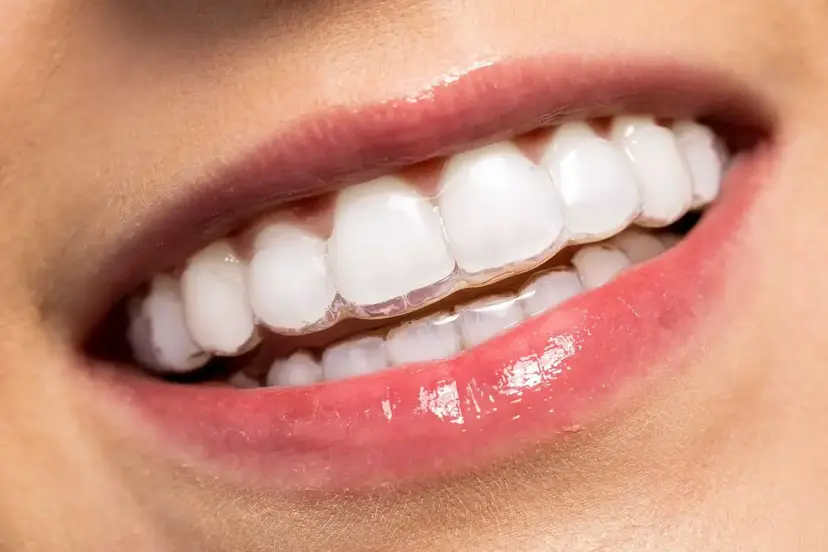MakeO blog
Have you ever felt a sharp pain in your teeth after eating ice cream or sipping hot tea? That is tooth sensitivity - a common problem which causes sharp pain on consuming hot, cold, sweet, or acidic foods and drinks. It affects 10–30% of people, especially adults aged 20 to 50, with women often experiencing it more. This sensitivity happens when the protective layers of your teeth wear down, exposing the softer part inside called dentin.
In this blog, we will dive into the causes of tooth sensitivity, how to identify its symptoms, and practical tips to treat and avoid it.
What Causes Teeth Sensitivity?
Everyday habits like brushing too hard, grinding your teeth, or too much consumption of acidic foods can make your teeth more sensitive. Sometimes, even dental treatments or using certain mouthwashes can contribute. Here’s a list of common dental issues that may lead to sensitivity:
- Enamel Erosion: Caused by excessive brushing, acidic foods, or certain medical conditions.
- Gum Recession: When gums pull back from the teeth, exposing the sensitive root area.
- Cracked Teeth: Cracks in the tooth can sensitize the nerves inside.
- Tooth Decay: Cavities that affect the enamel and expose the dentin.
- Teeth Grinding: This can wear down the enamel, making teeth more sensitive.
- Dental Procedures: Sensitivity may occur after treatments like cleanings, restorations, or teeth whitening, but this is usually temporary and resolves soon.
In some cases, sensitivity may also signal an infection. Pain from an infection can vary though, ranging from dull and aching to sharp and throbbing. If you experience severe or persistent sensitivity that doesn’t go away, it’s important to contact a dentist right away for further evaluation and guidance.
How to Identify the Symptoms of Teeth Sensitivity?
Teeth are made up of several layers, with enamel being the outermost protective layer, followed by dentin, which contains tiny channels, or tubules, that lead to the nerves inside the tooth. When protective layers like enamel or cementum are damaged, these tubules allow external triggers to reach the nerves, which can lead to specific symptoms of teeth sensitivity. These include:
Pain from Triggers: You may feel dull, sharp, or throbbing pain, often triggered by hot, cold, sweet, or acidic foods, or cold air. It may also occur when chewing or after dental treatments. The intensity of pain can vary depending on the cause, such as decay, gum recession, or tooth damage.
Discomfort from Sweet or Acidic Foods: Sensitivity may occur when eating sugary, acidic, or citrus foods. These can trigger pain by stimulating the exposed dentin or inner layer of the tooth.
Pain When Chewing: If chewing becomes uncomfortable or painful, especially with certain teeth, it could indicate exposed tooth roots or dentin.
Sensitivity to Air: Breathing in cold air through your mouth may cause sudden discomfort or sharp pain in your teeth, particularly if the gums are receding or if the roots are exposed.
Pain while brushing: Pain while brushing or flossing can be a sign of tooth sensitivity. This discomfort occurs because the protective enamel wears down, exposing the dentin, which is more sensitive to pressure and touch.
Discomfort After Dental Procedures: Sensitivity is common temporarily after dental treatments like fillings, cleanings, or restorations but should fade after a few weeks.
If you experience any of these symptoms, visit a dentist for proper diagnosis and treatment. While these may be uncomfortable, the good news is that teeth sensitivity can be prevented and managed well.
Effective Treatment Options for Teeth Sensitivity
Depending on the severity, there are several treatment options available to help manage and treat this condition of teeth sensitivity.
Desensitizing Toothpaste: Special toothpaste for sensitive teeth contains ingredients like potassium nitrate, which helps calm the nerves inside the teeth. Over time, this toothpaste can reduce pain and discomfort. Some toothpastes also contain sensitivity-reducing substances like fluoride.
Fluoride Treatments: When you have this issue of sensitive teeth, fluoride can be applied on your teeth directly by the dentist, which acts by sealing the teeth surfaces and protecting the nerves within. Fluoride can also help remineralizer and strengthen the teeth, making them more resistant to future decay and sensitivity.
Dental Restorations: For more severe cases, your dentist may recommend treatments like dental bonding or fillings. These can cover exposed areas of your teeth, providing a protective barrier and reducing sensitivity. In rare cases, if the sensitivity is very severe, treatments like root canals or gum grafts may be necessary.
Gum Therapy/ Gum Graft: If sensitivity is caused by gum recession, gum grafts can be performed to restore the gum tissue, protecting the roots of your teeth and reducing discomfort. Gum therapy can also help address any underlying gum disease contributing to sensitivity.
Advanced Treatments: Desensitization using laser therapy is performed to target the nerves inside the teeth. Laser helps reduce sensitivity by controlling the inflammation and pain. It is a non-invasive treatment that provides a quick and effective solution for long-lasting relief.
With the right treatment, you can reduce or even eliminate teeth sensitivity, improving both your comfort and your overall oral health.
If you have other related issues too, it is important to visit a dentist and address these problems at one go. makeO Toothsi is a one-stop solution for all your dental care needs. Our expert dentists ensure to provide the best treatment for your teeth sensitivity and guide you on personalized prevention tips. If you feel your teeth need to be brighter, you can opt for our safe and effective teeth whitening treatments at the most affordable teeth whitening costs or consider using our products for teeth whitening at home. Contact us today for attractive offers!
Preventing Teeth Sensitivity: Tips for Long-Term Oral Health
To prevent tooth sensitivity and maintain good oral health, it is important to adopt effective habits that protect your teeth. One of the best ways is to maintain a proper oral hygiene routine. Regular brushing with a soft-bristled toothbrush and flossing helps protect the enamel from wear and tear. Choosing toothpaste formulated for sensitive teeth can further reduce discomfort by helping to protect the enamel layer.
What kind of food you eat also plays a significant role in tooth sensitivity. Limiting the intake of acidic foods like citrus fruits and tomatoes, as well as sugary items, can help prevent enamel erosion. You can try to eat more calcium-rich dairy products like milk, cheese, and yoghurt which can strengthen your teeth.
For those who grind their teeth, using a mouth guard can prevent further damage and reduce sensitivity. Practicing stress management techniques, such as yoga or meditation, can reduce teeth grinding, further preventing sensitivity.
Additionally, regular visits to the dentist for check-ups and professional cleanings can help identify and treat any emerging issues early. By adopting these healthy habits, you can effectively manage and reduce tooth sensitivity, ensuring long-term oral health.
Conclusion
You can manage tooth sensitivity issues easily without disrupting your daily life. By identifying its causes and adopting good oral care habits, including proper oral hygiene practices, avoiding harmful foods, and visiting your dentist regularly, you can effectively reduce discomfort. Plus, desensitising toothpastes, fluoride application and dental restorations are usually very effective in providing relief for your teeth sensitivity. With the right treatment and preventative measures, you can enjoy a pain-free, healthy smile for years to come.
FAQs
1. What causes tooth sensitivity?
Tooth sensitivity is caused by the exposure of dentin, the inner layer of the tooth, due to enamel wear, gum recession, or habits like brushing too hard.
2. How can I identify if I have sensitive teeth?
If you feel sharp pain from hot, cold, or sweet foods, or discomfort when chewing, you might have sensitive teeth. Presence of white/dark spots on teeth, worn out teeth or damaged teeth can also be the cause. Gum recession can also contribute.
3. What can I do for sensitive teeth?
Use desensitising toothpaste, avoid acidic foods, brush gently with a soft toothbrush, and visit your dentist for treatments like fluoride application or dental bonding.
4. How long does sensitivity last after dental procedures?
Sensitivity after procedures like cleanings, fillings or using teeth whitening kits is possible but usually fades within a few weeks. If it persists, consult your dentist for further treatment.
5. Can gum recession cause tooth sensitivity?
Yes, gum recession exposes the tooth roots, which increases sensitivity. Using gentle brushing techniques and fluoride treatments can help prevent further recession and sensitivity.
6. How can I prevent tooth sensitivity?
Prevent sensitivity by maintaining a proper oral hygiene routine, avoiding acidic foods, using a mouth guard for grinding, and visiting the dentist regularly for check-ups.
related categories
Related articles

Types of Braces: Removable vs Fixed Braces, Which is Right For You?

This Diwali, Smile Bright With makeO Teeth Whitening Kit

Dr. Pravin Shetty: Pioneer in Lingual Orthodontics & Innovative Smile Solutions
How do I Know I’m the Right Candidate for makeO toothsi Teeth Aligners?

